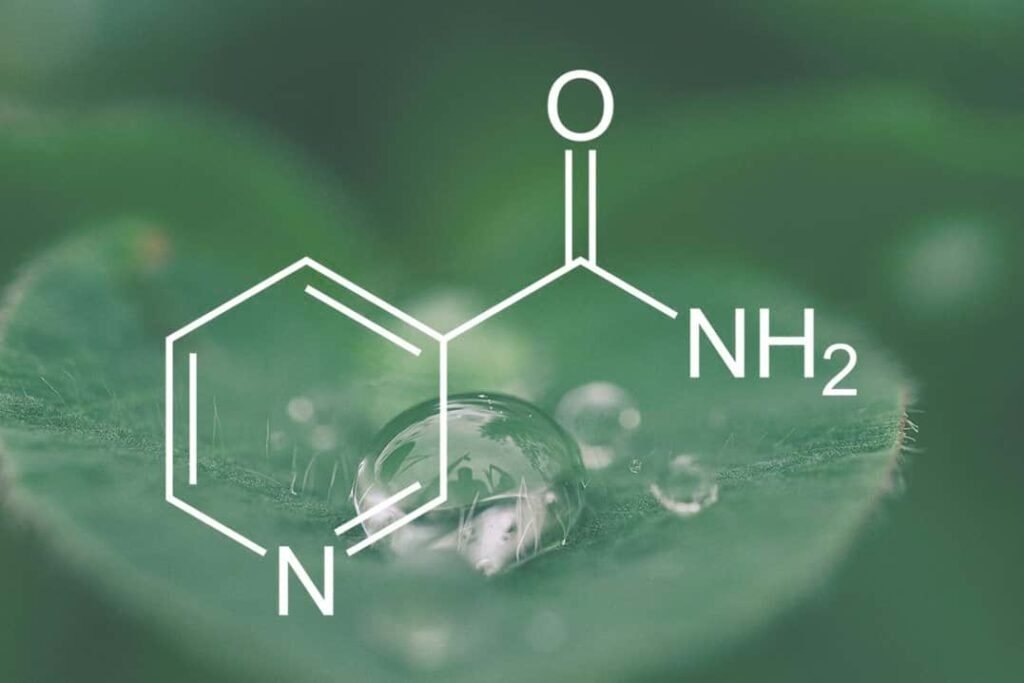turmeric Anti-Aging effects
Top #7 Turmeric: Anti-Aging effects If curcumin can really help prevent heart disease, cancer and Alzheimer’s, it would have obvious benefits for
Niacinamide is a form of vitamin B3 which is essential for your metabolism as it is needed to make the coenzymes NAD and NADP. It can also be used in the field of cosmetics and has several virtues, in particular in the fight against aging, irritation and inflammation of the skin. A dietary deficiency of vitamin B3 causes a disease characterized by photosensitive dermatitis.

Niacinamide (vitamin B3) is needed to make essential coenzymes called NAD and NADP. These enzymes are indispensable because they play the role of energy transfer molecules in many metabolic reactions, including the breakdown of carbohydrates, fats, proteins and alcohol, as well as in the synthesis, for example, of some hormones and some important lipids. They also have the heavy responsibility to regenerate certain molecules involved in the natural detoxification process of our body and in the antioxidant mechanisms.
Niacinamide is often confused with niacin, which is incorrect. Although niacinamide and niacin are both forms of vitamin B3, they have slightly different chemical structures, and only niacin (not niacinamide!) Seems to cause redness. Niacinamide is therefore often the preferred vitamin B3 in skin care.
When applied topically it contributes first to fight against aging of the skin (especially wrinkles and fine lines) and second to maintain hydration thereof. Niacinamide even helps fight skin discoloration, redness, irritation, and inflammation. Not bad for just one nutrient!
♦On Body: The molecule stimulates the synthesis of lipids, essential to fight against the loss of water from the stratum corneum. By improving lipid cohesion, it improves the skin barrier function, which is less prone to dehydration. More resistant, skin repair capacity is also enhanced. .
♦On Face: The soothing, antioxidant and anti-inflammatory properties of niacinamide make it possible to act upstream on the prevention of hyperpigmented stains. Marks on the face can be faded thanks to its action. The complexion is more uniform and luminous.
Severe Niacinamide deficiency causes a disease called pellagra. This is a serious disease that manifests primarily as photosensitive dermatitis, and people exposed to the sun are likely to develop a thick, scaly, strongly pigmented skin rash. Other symptoms include digestive disturbances such as vomiting or diarrhea, and nervous system dysfunctions such as fatigue and memory loss. It is recommended that you consume around 14 to 16 mg of vitamin B3 per day, and in most cases, diet will achieve this intake. You can find good amounts of this vitamin in chicken, turkey and salmon, but also in green leafy vegetables or legumes and seeds.
Top #7 Turmeric: Anti-Aging effects If curcumin can really help prevent heart disease, cancer and Alzheimer’s, it would have obvious benefits for
Top #6 Arthritis Patients Respond Very Well to Turmeric Supplements Share on facebook Share on twitter Share on pinterest Share on
Top #5 Improved Antioxidant Capacity Share on facebook Share on twitter Share on pinterest Share on email Antioxidants are able to
Top #4 Turmeric could Be Useful in Preventing and Treating Alzheimer’s Disease Share on facebook Share on twitter Share on pinterest
Top #3 Turmeric Can Help Prevent (And Perhaps Even Treat) Cancer Share on facebook Share on twitter Share on pinterest Share
Top #2 Turmeric Lowers Your Risk of Heart Disease Share on facebook Share on twitter Share on pinterest Share on email
Statements on this website have not been evaluated by the Food and Drug Administration. Products are not intended to diagnose, treat, cure or prevent any disease. If you are pregnant, nursing, taking medication, or have a medical condition, consult your physician before using our products.
Disclaimer: this site is not a part of the Facebook™ website or Facebook Inc. Additionally, this site is NOT endorsed by Facebook™ in any way. FACEBOOK is a trademark of FACEBOOK, Inc.

Your Privacy Is Important To Us
This website uses cookies so that we can provide you with the best user experience possible. Cookie information is stored in your browser and performs functions such as recognising you when you return to our website and helping our team to understand which sections of the website you find most interesting and useful.
Strictly Necessary Cookie should be enabled at all times so that we can save your preferences for cookie settings.
If you disable this cookie, we will not be able to save your preferences. This means that every time you visit this website you will need to enable or disable cookies again.
More information about our Cookie Policy